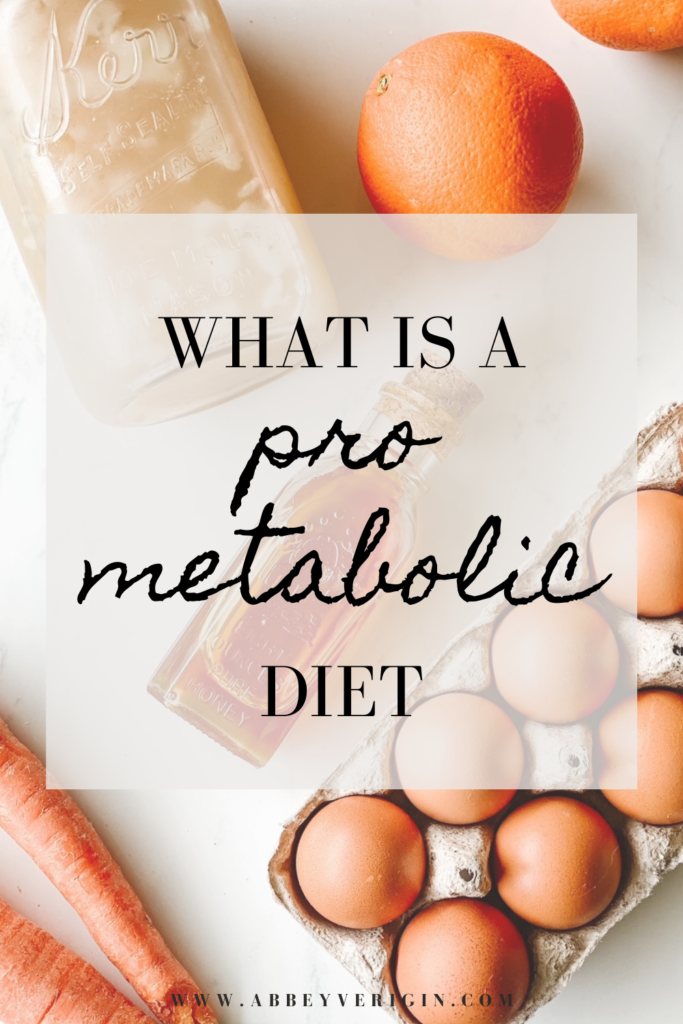What is a pro-metabolic diet? Simply put, it is a way of eating that supports metabolic health. The metabolism is a window into our overall health.

To put it simply, a pro-metabolic diet is essentially eating in a way that supports the metabolism.
What Is The Metabolism?
Chances are when you think of the metabolism, you think of the rate in which we burn fat. In reality it is responsible for every single metabolic process that takes place in our bodies. If you want to get a good picture of your overall health, take a look at your metabolism.
Our metabolism is responsible for thinks like your immune system, sex hormones, and so, so much more. Our metabolism is how our body takes things like glucose, vitamins, minerals, proteins, and fats and turns them into energy, or heat.
If our metabolism is not functioning optimally, we will see that through symptoms. For example, our metabolism directly impacts our hormones. Our cells use hormones as chemical messengers. When our cells are stressed out, not functioning properly, or haven’t been given the tools they need to function properly (ie, food!), our hormones are going to begin to get a little out of whack.
Are The Health Foods You Are Eating Really Healthy
I have lived through green smoothie phases, loading up on raw kale, and consuming nut butters by the spoon full – all of which mainstream health advice would praise you for. When we take a step back it is so clear that these foods in large quantities can be huge stressors to our digestive system, our thyroid, and our metabolism. It’s not that these foods are inherently bad, but where in nature would we be pounding back nuts in absurd amounts (especially due to nut milks) without properly preparing? Absolutely nowhere.
If you really think about it, do you crave these foods? Has your body ever begged you for them? I’m guessing not, especially the raw kale salad. If you think you crave raw kale, it is likely the fats in the dressings you’re after, because I think it’s safe to assume you aren’t eating raw kale all by itself. Nut butter? Maybe you think you crave it because you can’t get enough, but if those fats were truly nourishing you, you’d feel satisfied after just a bit.
Children are so intuitive, and I don’t think we give them enough credit. Fruits and milk always seem to be kid favorites, and for good reason. These foods that mainstream health advice may have told you are ‘bad’ are so nourishing to our bodies.
What Is A Pro-Metabolic Diet?

A pro-metabolic diet is a way of eating that supports metabolic function. It is getting nourishing our bodies with foods that support of our biology. If you understand basic human physiology, there is no question on whether or not these foods are metabolically supportive.
When we talk about pro-metabolic eating, it really is based off of human physiology. Maybe you have heard that carbohydrates are bad. That seems to be a common misconception. Well, when we look at human physiology it is crystal clear that our bodies run on glucose. That isn’t an opinion, that is fact.
How The Pro-Metabolic Diet Supports Our Body
Consuming a diet rich in bioavailable foods is how we support our metabolism. Bioavailable foods are easy to digest, nutrients are easily assimilated and absorbed, and they are easy for the body to use as energy. Our modern day world is so packed full of stress in every way. We are constantly exposed to stress. Environmental toxins, EMF’s, pharmaceuticals all contribute to stress, let alone our day to day lifestyle stress. Our bodies are in a constant state of stress, and eating a metabolically supportive diet is the perfect way to combat stress hormones.
When we are running on stress hormones, thyroid hormone production is impacted. Our thyroid function determines our metabolic function. When we are stressed, thyroid is impaired, therefore our metabolism is impaired. Our bodies goal is to feel safe. When it is in that state of stress, it will slow our metabolism right down in order to avoid expending more energy than necessary.
It is literally impossible for us to completely avoid stress in this day in age. By consuming metabolically supportive foods, we can support metabolic function. If we are fueling our bodies properly and enough we can lower those stress hormones.
Why The Pro-Metabolic Diet Works
First off, I really hate to call this a diet, because it is so far from one. This is getting back to fueling our bodies as they were meant to be fueled. Plus, most diets I have seen don’t include the foods our bodies naturally gravitate towards.
My eating a pro-metabolic diet, we are simply focusing on foods that support our bodies on a cellular level. Our cells preferred source of energy is glucose, aka, carbohydrates. Every single cell in our body runs on glucose.
If we’re eating a low carbohydrate diet, we will likely be riddled with symptoms. Our bodies need glucose. If we aren’t getting it from the food we eat, our bodies will make it. Gone low carb? Your body is going to convert protein and fat into glucose. There’s no getting around it – our bodies run off of glucose, and we can make it a lot easier on it if we just give it what it’s asking for.
The liver needs glucose to properly detox. If it isn’t getting it from food, it’s going to use the process gluconeogenesis to break down muscles, tissues, and organs to get what it needs. This is a guaranteed way to elevate stress hormones. If we are constantly not giving our bodies what it needs like this, those elevated stress hormones are going to impact thyroid function, and therefore metabolism. Obviously this is not what we are after.
We know our bodies need glucose, so why are we trying so hard to avoid carbohydrates? I don’t think it’s too hard to understand that if we fuel our body with what it needs, instead of trying to trick it, our health will improve.
Eating pro-metabolically is feeding our body as it is intended to be fed. Eating in a way that is supportive to our body means less stress on the body, and that it will have an easier time handling external stressors.

What Are Pro-Metabolic Foods
Well, foods like fruits, root vegetables, honey, maple syrup, grass fed and pasture raised meats, eggs, saturated fats like butter and coconut oil are all going to be very metabolically supportive. Notice how most of these foods have been demonized. These foods are getting back to our roots, before diet culture and big industry began to dictate how we eat.
A diet high in polyunsaturated fatty acids (PUFA’s) like vegetable oils and nuts are not going to support the metabolism. That doesn’t mean to avoid them completely, just something to be mindful of.
I know often times people want a set list of foods they can and cannot eat. That’s diet culture stepping in. There are no rules. This isn’t a diet, it’s learning how to best fuel your body. A simple way to test how a certain food works for you is by getting familiar with your temperatures and pulses. You can learn all about that here.
Signs Of A Strong Metabolism
Listed below are some markers of good health. Chances are if you aren’t ticking most of these boxes, your metabolism needs a lot of love.
- Warm Hands & Feet
- Steady Energy Throughout The Day
- Strong Libido
- Easily Falls Asleep & Stays Asleep
- Strong Hair & Nails
- Great Digestion
- 1-3 Good Bowel Movements Every Day
- Regular Periods/Ovulation Free From PMS Symptoms
- Happy & Positive Disposition
- Maintains Weight Easily
- Strong Immune System
- Waking Up With An Appetite!
- Basal Body Temperature Between 97.8-98.6 F or 36.6-37.0 C
- Pulses Between 75-90 BPM
Low sex drive, mood swings, low energy, and hair loss are all much too normalized. A strong libido is a sure sign that our body is craving reproduction. If we constantly have a low sex drive, it is likely because our body is not in a great place to reproduce. Mood swings may be common, but they are not at all normal. It may sound far fetched to live daily life without experiencing these symptoms, however it is totally possible when we treat our bodies with respect.
How To Support The Metabolism
Increase your calories! Most clients I see are not eating near enough calories. If you are eating 1200 calories a day, please know that is enough for a toddler. Grown women need far more calories than the diet industry claims. For most women, 2000 calories per day should be a minimum. Fuel your body well and it will function as it’s supposed to. When we are constantly eating less than our bodies require, our metabolism is going to slow right down. This is because if our body isn’t getting what it needs, the metabolisms goal is to conserve energy.
Eat when you wake! It is more common than not to have a low appetite upon waking. By the time you wake up in the morning, you have already been in a fasted state for likely a minimum of 8 hours. By this point, your glycogen stores are going to be depleted. Your body needs some fuel! Skipping breakfast, and on top of that, consuming coffee on an empty stomach, is a sure way to negatively impact your thyroid, and therefore your metabolism. Aim to have your first meal within 30 minutes of waking. If you’re not hungry, start by implementing a snack first thing. As your metabolism begins to heal, your appetite will come back.
Eat Carbohydrates, Protein & Fat Together. Protein and fat will help to slow the release of glucose into the blood stream. This means no crashes in energy! We all have experienced those incidences when we eat a ton of carbohydrates alone, have a huge spike in energy, followed by a crash. Combining carbohydrates, protein, and fat together will keep you off of the blood sugar rollercoaster.
Swap the PUFA’s for saturated fat. If you still believe that saturated fats cause heart disease, please know this has been debunked for decades. Saturated fats are much more stable than polyunsaturated fatty acid’s. PUFA’s can be disruptive to our thyroid, and therefore impact our metabolism. Nuts are high in PUFA’s, and these days with nut milks, nut cheeses, and nut flours, we are pounding them back on a daily basis. On top of that, we aren’t even preparing them properly. Ditch the nuts and focus on saturated fats which have the fatty acids to support metabolic function.
Resources For A Pro-Metabolic Lifestyle
Hypothyroidism: The Unsuspecting Illness by Dr Broda Barnes
How To Heal Your Metabolism by Kate Deering
More Posts You Will Love
How To Track Temps & Pulses For Metabolic Health
Pin It For Later


